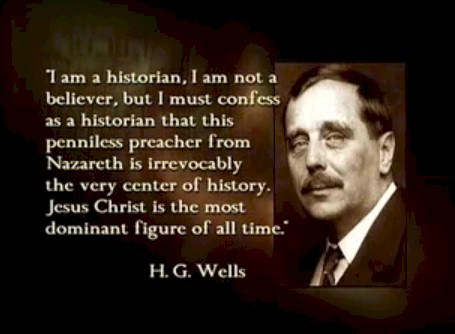Was Jesus God? Does It Matter?
Pagan worship or idolatry was a problem for Israel from its very beginning, and is, I believe, the central theme in the Hebrew Bible. Salvation for the Jews meant being saved from their circumstance, which was the first diaspora, having been driven from the promised land, the destruction of their temple, and with it, the ability to atone for sin "Without blood there can be no atonement for sin". Salvation from a burning hell into heaven, with the primary focus on the after-life was a later Christian invention and is essentially non-existent in the Old Testament.
The process of isolating Jewish worship and tradition from the influence of the dominant pagan cultures (Egypt, Persia, Babylon, Greece and Rome etc.) would appear to be a losing battle, both for them and us. However, the transference of wealth and knowledge that generally comes as the result of economic trade, and to a lesser degree colonialism, has generally provided a substantial benefit for all parties, even if those benefits accumulated disproportionately to the colonizers.
This same phenomenon is occurring in the promised-land today, as American and European powers vie for Middle-Eastern oil. And, make no mistake; as much as some Muslims may hate the influence of American culture, it has been overwhelmingly beneficial in terms of education, wealth creation and the potential growth of democracy in the region.
When the Jewish prophets wrote about Babylon as the great harlot it reflected the voice of a people longing for freedom and the rebuilding of Israel (God’s Kingdom). This is the same vision fundamentalist Muslims have regarding modernity and freedom, with America as the “Great Satan”. Theirs is a desire to return to the days of the great Islamic enlightenment, flourishing as it did prior to emergence of the various European powers, not unlike Israel in the time of Jesus.
The process of isolating Jewish worship and tradition from the influence of the dominant pagan cultures (Egypt, Persia, Babylon, Greece and Rome etc.) would appear to be a losing battle, both for them and us. However, the transference of wealth and knowledge that generally comes as the result of economic trade, and to a lesser degree colonialism, has generally provided a substantial benefit for all parties, even if those benefits accumulated disproportionately to the colonizers.
This same phenomenon is occurring in the promised-land today, as American and European powers vie for Middle-Eastern oil. And, make no mistake; as much as some Muslims may hate the influence of American culture, it has been overwhelmingly beneficial in terms of education, wealth creation and the potential growth of democracy in the region.
When the Jewish prophets wrote about Babylon as the great harlot it reflected the voice of a people longing for freedom and the rebuilding of Israel (God’s Kingdom). This is the same vision fundamentalist Muslims have regarding modernity and freedom, with America as the “Great Satan”. Theirs is a desire to return to the days of the great Islamic enlightenment, flourishing as it did prior to emergence of the various European powers, not unlike Israel in the time of Jesus.

What does this have to do with the potential application of pagan ideas to the idea of Jesus as god? By the time the Hebrew Scriptures were formally written down Israel had experienced seismic changes in their culture. Paganism, in one form or another impacted their language, symbols, customs and certainly their world-view. This included the adaptation of older myths to accommodate their deeply personalized expression of non-Jewish traditions. Out of which eventually emerged a distinct monotheism with a uniquely egalitarian and moral character. It does not, however, emerge in a vacuum, but, is the product of the collective knowledge and wisdom of just about every major society in the ancient world. To this day modern Jews still exhibit all of these characteristics, which might be why their influence in science, politics, economics, literature, the arts and religion has no parallel. Remarkable when you consider that there is less than 14,000,000 Jews in world. They have survived when every other great nation of history has perished. It would seem likely that when America passes into history, the Jews will remain.
Jesus was continuation of this tradition, he was a Jew that changed the world—meaning the way in which men viewed God and the way that they relate to one another. He streamlined their tradition like a masterful theological libertarian, dispensing with complex religious rituals and replacing the Law with two commands; “Love the Lord your God with all of your heart. And love your neighbor as you love yourself”!
Is it possible that many of the early Christians were semi-literate Jewish peasants, including an increasing number of pagan gentiles, who adopted a view of Jesus that was influenced by Greco-Roman culture? Paul was a Pharisee; he was also a Hellenized Jew and Roman citizen whose version of the scriptures was the Greek Septuagint, he likewise wrote in Greek and argued and wrote using Greek philosophic methods. That he, among others, could have been influenced by pagan thought doesn’t seem much of a stretch. Moses adopted Assyrian and Egyptian iconography and law, the use of winged beings with horse’s bodies and four heads being a good example, the influence of the Code of Hammurabi being another. Other aspects of early Jewish worship were adapted from pagan culture as well. One need only look at the Temple of Solomon for reinforcement of this idea.
This is a very pragmatic view of scripture and reflects what we can actually know beyond personal beliefs. It may lack the overlay of myth and symbolism, but, it is, nonetheless, observably true. That a Jew, especially one put to death by his own people and the Romans has survived to alter the course of history, and with it human behavior, may be the greatest miracle of all. Jesus the man, the peasant Jewish Rabbi is the centerpiece of Human history, this is true for all men, no matter what they believe. His vision of God has become the vision for most of the world, even where other religions thrive. And where his morality is applied it has moved mountains and made the way straight for all of us.
Jesus was continuation of this tradition, he was a Jew that changed the world—meaning the way in which men viewed God and the way that they relate to one another. He streamlined their tradition like a masterful theological libertarian, dispensing with complex religious rituals and replacing the Law with two commands; “Love the Lord your God with all of your heart. And love your neighbor as you love yourself”!
Is it possible that many of the early Christians were semi-literate Jewish peasants, including an increasing number of pagan gentiles, who adopted a view of Jesus that was influenced by Greco-Roman culture? Paul was a Pharisee; he was also a Hellenized Jew and Roman citizen whose version of the scriptures was the Greek Septuagint, he likewise wrote in Greek and argued and wrote using Greek philosophic methods. That he, among others, could have been influenced by pagan thought doesn’t seem much of a stretch. Moses adopted Assyrian and Egyptian iconography and law, the use of winged beings with horse’s bodies and four heads being a good example, the influence of the Code of Hammurabi being another. Other aspects of early Jewish worship were adapted from pagan culture as well. One need only look at the Temple of Solomon for reinforcement of this idea.
This is a very pragmatic view of scripture and reflects what we can actually know beyond personal beliefs. It may lack the overlay of myth and symbolism, but, it is, nonetheless, observably true. That a Jew, especially one put to death by his own people and the Romans has survived to alter the course of history, and with it human behavior, may be the greatest miracle of all. Jesus the man, the peasant Jewish Rabbi is the centerpiece of Human history, this is true for all men, no matter what they believe. His vision of God has become the vision for most of the world, even where other religions thrive. And where his morality is applied it has moved mountains and made the way straight for all of us.
